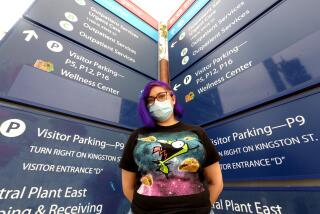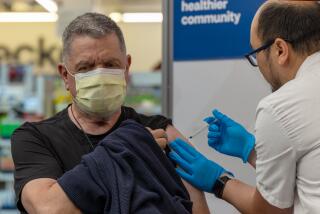Women experience delays in getting biopsies in some L.A. County-run hospitals
- Share via
Doramay Bailey got the bad news last year. Her annual mammogram at the county’s Martin Luther King, Jr. Multi-Service Ambulatory Care Center in Willowbrook revealed a lump in her left breast. She needed a biopsy to determine whether she had cancer.
But when she called to schedule an appointment at Harbor- UCLA Medical Center, the disabled 58-year-old grandmother got more bad news. She was told the soonest she could be seen was February, five months later.
Bailey is one of many women who have encountered increasingly long waits for biopsies at Harbor-UCLA, while those seeking biopsies at other hospitals are treated within weeks, if not sooner. The delays do no violate state or federal law, but patients and advocates say they cause excessive stress, and do not bode well for the county’s ability to adapt to national healthcare reforms.
Demand for county medical services has increased across the board over the last several years, due in great part to people losing jobs and employer-sponsored health insurance.
Hospital officials insist that claims of excessive delays for biopsies are exaggerated but acknowledge the number of patients seeking care at the county’s Department of Health Services has surged, as fewer private providers, especially specialists, are willing to treat patients without private insurance.
“More and more people are not doing these things on uninsured patients and that leaves more on our doorstep,” said Carol Meyer, the department’s chief network officer.
A Harbor-UCLA doctor, who asked not to be identified for fear of retaliation, said the average wait time for breast biopsies was eight to nine weeks.
Vanessa Wright, 53, of Hawthorne, had a mammogram at MLK on Sept. 16, 2009, that showed a lump in her right breast. She could not get an appointment for a biopsy at Harbor until March 12.
The home health aide and mother of four said she spent the intervening months worrying about whether she had cancer and, if so, who would care for her aging aunt and disabled daughter.
“I knew a woman who had breast cancer and she just shriveled up,” Wright said. “You think of that, all the stress and anxieties, when you’re waiting.”
County officials insisted recently that the average wait time was only one to four weeks. But Meyer conceded that because of the large number of uninsured patients — many referred from private hospitals — Harbor’s radiologists are clearly “overwhelmed.”
Of Harbor-UCLA’s three radiologists, only two have time to conduct biopsies one day a week. Together, they do an average of 17 biopsies a week, about 900 a year, Meyer said.
The situation was further complicated last year after MLK’s sole contract radiologist left on long-term leave and was not immediately replaced, Meyer said. Since then, MLK doctors have been referring four to six women to Harbor each week.
“We know that there’s more demand than we have staff and capacity for,” Meyer said.
There are no federal or state requirements or professional guidelines specifying how soon a woman should receive a breast biopsy.
But Dr. Carol Lee, who leads the breast commission at the American College of Radiology, said she was “surprised” and “puzzled” that women would be forced to wait months for biopsies. Lee said the average wait at most hospitals ranges from a day to a few weeks, including hospitals that serve low-income, uninsured patients.
“You want to do it as soon as possible so that the woman doesn’t have to worry,” she has cancer, Lee said.
Dr. Lawrence Bassett, a researcher and breast imaging expert at UCLA’s Jonsson Comprehensive Cancer Center, said his patients often receive breast biopsies the same day they are ordered, or within two weeks at the most.
“I can’t imagine any place taking that long to do the biopsy,” he said. “If we told a patient they had to wait a month, they’d be going to St John’s or Cedars.”
Meyer said private doctors and hospitals do not face the same demands as those in the county system.
“They determine what patients they get to see. They don’t have a never-ending stream of patients in need,” she said.
When Bailey finally had a biopsy Feb. 18, the test showed she had stage four cancer. The doctor told her she probably had two to three years to live, she said.
Upset by the delay, Bailey sought treatment at the private City of Hope National Medical Center in Duarte, which is 45 minutes by bus from her South Los Angeles Home. But she said the trip was worth it because she has been treated promptly — she already has received four courses of chemotherapy.
“They just took too long at Harbor to do anything,” Bailey said.
Bailey’s oncologist at City of Hope, Dr. Thehang Luu, said a quicker biopsy would not have prevented Bailey from developing metastatic breast cancer or improved her prognosis. But it would have allowed Bailey to start chemotherapy sooner.
“Certainly, the sooner you treat, the better,” Luu said.
Charlotte Robnett, 50, of Los Angeles and a friend were both referred to Harbor-UCLA for biopsies after they received mammograms at MLK in November. She said it took months for them to get appointments at the hospital. When they finally got biopsied, it showed her friend had cancer, but Robnett did not.
Robnett said she felt relieved — and frustrated.
“I think if I had insurance I wouldn’t have had to wait so long,” she said.
Meyer said county officials plan to hire a new contract radiologist at MLK this fall, but have had trouble finding one trained to perform the type of ultrasound-guided breast biopsies done at Harbor-UCLA. They are also in negotiations with a contractor to begin supplying equipment to the hospital for MRI-guided breast biopsies.
Meyer said county health officials realize that as more patients become insured under national healthcare legislation in coming years, county facilities will have to improve their efficiency or risk losing patients to private hospitals.
“We are going to be looking at reducing wait times and improving customer services in an effort to meet the goals of healthcare reform,” Meyer said.
molly.hennessy-fiske@latimes.com
More to Read
Sign up for Essential California
The most important California stories and recommendations in your inbox every morning.
You may occasionally receive promotional content from the Los Angeles Times.














